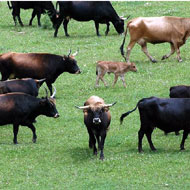
Herd of "super cows" in Devon are descended from those bred in Nazi Germany
A farmer has been forced to cull part of his herd of Heck cattle, which are descended from cows bred for aggression in Nazi Germany.
Derek Gow imported 13 Heck cows from Holland and Belgium back in 2008. It was the first time they had ever been imported into Britain.
Mr Gow has had to cut his herd down to six cows due to their aggressive and dangerous nature.
He told The Guardian: "The ones we had to get rid of would just attack you any chance they could. They would try to kill anyone. Dealing with that was not a lot of fun at all.
"I have worked with a range of different animals from bison to deer and I have never come across anything like these. They are by far and away the most aggressive animals I have ever worked with.
"Some were perfectly calm and quiet and they are the ones we have kept. The others you could not go near."
Heck cows are the result of an attempt to bring back the extinct Auroch, which is often confused with the European bison.
Two German zoo directors, Heinz and Lutz Heck, tried to revive the species in the 1920s, an attempt that was supported by Hermann Goering, head of Hitler's Luftwaffe. Within a few generations, the pair managed to breed calves that had a similar appearance and ferocity to the Auroch.
While most Heck cows were destroyed after the Second World War, some survived.
Image courtesy of Derek Gow.



 The RCVS has announced a new version of its 1CPD mobile app, with enhanced features for veterinary surgeons and veterinary nurses to record their continuing professional development.
The RCVS has announced a new version of its 1CPD mobile app, with enhanced features for veterinary surgeons and veterinary nurses to record their continuing professional development.